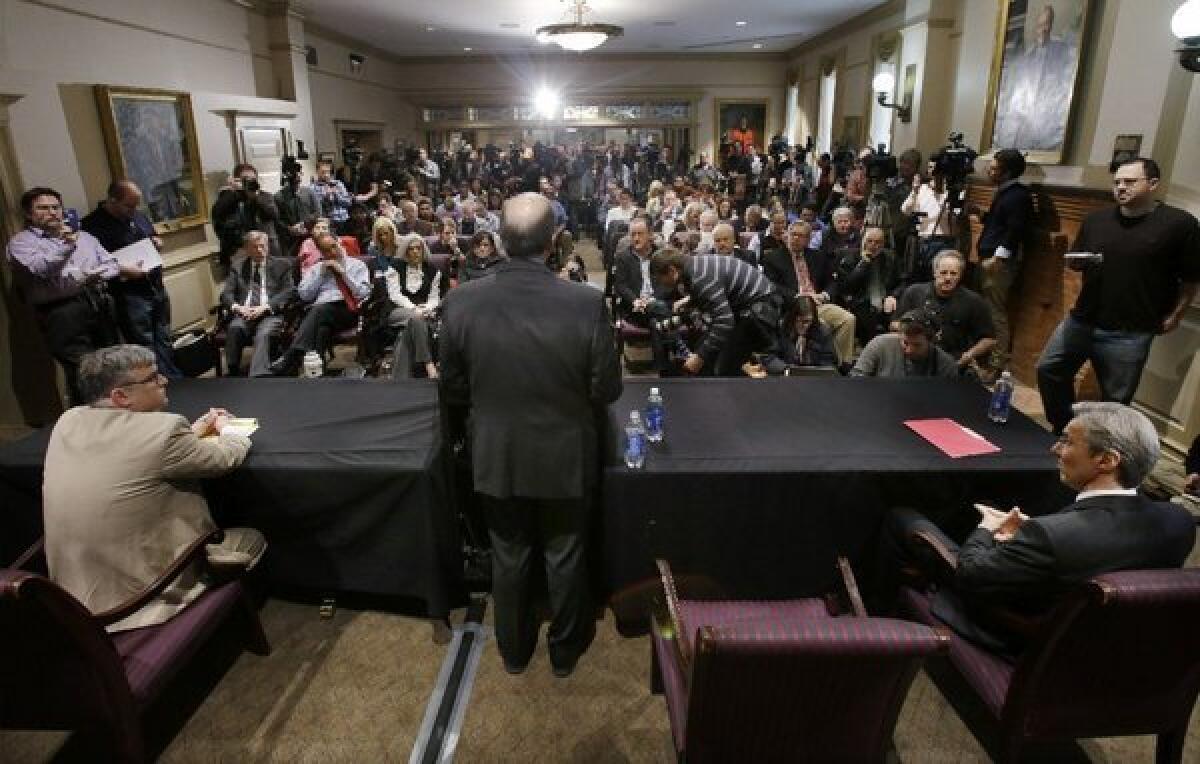Attorneys: Rutgers had legal basis to fire coach but didnāt

Rutgers University officials had known for months that their basketball coach had harassed players in practice so severely that he could have been fired, according to a university report.
Concerned by practice footage of Coach Mike Rice roughhousing Rutgers athletes and using gay slurs, outside attorneys hired by the university in November 2012 discreetly compiled a report that said Rice had broken university harassment and intimidation policies. Riceās contract included a stipulation that he not do anything to embarrass the university, which his behavior had clearly violated, the attorneys said.
But Rutgers officials -- presented with legal justification for firing a coach whoād repeatedly thrown basketballs at his playersā bodies and shoved them violently from behind -- instead decided to keep Rice on the job with only minor punishment: a $75,000 fine, a three-game suspension and an order to attend anger management classes.
The scandal mushroomed last week when ESPN aired practice videos showing Riceās behavior. Since then, Rice, assistant coach Jimmy Martelli and Athletic Director Tim Pernetti have lost their jobs. University President Robert Barchi, also under criticism for not viewing video evidence of the coachās behavior sooner, has called the handling of Riceās behavior āa failure of process.ā
The case gained more texture with the release of the internal review into Riceās actions. Rutgers officials provided the outside law firmās report to the Los Angeles Times.
The review by Roseland, N.J., law firm Connell Foley legally damned Riceās behavior but painted a softer portrait of the allegations. The review, reportedly completed in January, found no merit in claims of whistle-blower retribution by a former basketball assistant who has become an increasingly complex figure in the controversy.
Eric Murdock, former director of player development, has filed a whistle-blower lawsuit against the university claiming that he was fired for bringing up Riceās behavior. He is also the subject of a possible Federal Bureau of Investigation inquiry into extortion, according to the New York Times and the Associated Press.
A Rutgers spokesman declined a Los Angeles Times request for comment on the investigation. The FBI and attorneys for Murdock did not respond to requests for comment Sunday.
[Update, 5:20 p.m. April 7: FBI spokeswoman Barbara Woodruff declined to comment Sunday on the reports of an investigation, citing U.S. Department of Justice policy.]
In a Dec. 27 letter provided to the Los Angeles Times by a Rutgers spokesman, Murdock attorney Barry Kozyra tells university officials, āIt is unfathomable to think that Mr. Riceās employment with the university (at the cost of the taxpayers of this state) continues, while Mr. Murdock remains unemployed for simply having done the right thing.ā Kozyra then states Murdock would settle his claims against the university for $950,000.
The universityās external report said lawyers could find no proof that Rice or Pernetti had fired Murdock at the end of June 2012, as Murdock contends. Instead, the report said, Murdock had a disagreement with Rice about leaving a practice early and did not show up for a follow-up meeting with Pernetti and Murdock, so Pernetti let Murdockās contract lapse.
Murdockās attorney, Kozyra, then took his claims of whistle-blower retaliation to Pernetti and Rutgers interim President Richard L. Edwards, setting in motion the investigation into Riceās conduct.
The universityās outside attorneys, hired Nov. 27, interviewed players and coaches about Riceās behavior, which was portrayed as part of an effort by a new coach, hired two years earlier, to shake up the teamās lethargic performance on the court and in the classroom.
āCoach Rice communicated to the players and coaches that he wanted to make them ācomfortable in chaos,ā a theme that was repeated to us by virtually every coach, every player and every basketball administrator that we interviewed,ā the report stated. āAll of the players and coaches with whom we spoke also conveyed to us that they fully understood that the āchaosā created by Coach Rice in practice was not mean-spirited, but was designed to prepare the players to become more competitive and to remain calm when similar āchaosā would occur in their games.ā
The report noted that Rice was successful in increasing the teamās GPA and graduation rates while putting a competitive squad on the floor. Investigators also said Riceās conduct had been more intimidating in his first season (2010-2011), and players were warned that the experience would be uncomfortable.
āThe following year, however, virtually everyone, including [Murdock], saw Coach Rice make efforts to be more positive toward the players, several of whom were freshmen,ā the report said. āThis change in approach was deemed necessary because the freshmen players were less responsive to coach Riceās instruction when he was too ānegative.āā
In early 2012, an upperclassman complained to Pernetti that heād been ābulliedā and that the coach was being harder on older players than on the freshmen, at which point Pernetti warned Rice to treat his players equally, the university report said. Pernetti also reprimanded Rice in early 2012 for being ejected after yelling at an official.
On Nov. 26, 2012, Murdockās attorney presented a 30-minute DVD of Riceās conduct to Pernetti, an outside attorney for Rutgers and a chief financial officer for the athletics department. Later that day, Pernetti showed the DVD to Rice, who expressed regret for some of the actions.
The universityās outside officials would later call the DVDās footage āout of contextā for Riceās practices ā they represented one half of 1% of the practices heād had with his team. They also noted that the practices were generally open to reporters, recruits and boosters, and that officials had never received a complaint about Riceās behavior.
āWe find that many of the actions of Coach Rice, while sometimes unorthodox, politically incorrect or very aggressive, were within the bounds of proper conduct and training methods in the context of preparing for the extraordinary physical and mental challenges that players would regularly face during NCAA Division I basketball games,ā the report stated.
But the report nonetheless found there was āsufficient evidence ā¦ that certain actions of Coach Rice did ācross the lineā of permissible conduct and that such actions constituted harassment or intimidation within Rutgersā policy,ā adding that āPernetti could reasonably determine that Coach Riceās actions tended to embarrass and bring shame or disgrace to Rutgers in violation of Coach Riceās employment contract with Rutgers.ā
ALSO:
Kansas latest state poised to restrict abortion
Woman leads prayer at major Mormon conference
Fish on board set adrift by Japan tsunami land in U.S.
More to Read
Sign up for Essential California
The most important California stories and recommendations in your inbox every morning.
You may occasionally receive promotional content from the Los Angeles Times.











